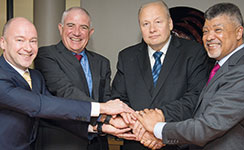UJ looks to Finland to encourage local tech startups
22 February 2017
Editor's Choice
News
Speaking at a ceremony at UJ’s Auckland Park campus on 31 January, vice-chancellor Prof Ihron Rensburg explained: “We want to see our students and other young people start businesses valuable to the economy. We want them to create jobs and grow local economies rather than to be looking for employment. Obviously we train them to be ready for the workplace. However, we want far more young people to plan and start businesses, understanding what it takes, how it needs to be done, and what support is available to make it a success.”
From left to right: Dr Kyösti Väkeväinen, vice president: Research, Development and Innovations, Laurea University of Applied Sciences (LUAS); Prof Roy Marcus, council chairperson, UJ; Prof Jouni Koski, president, LUAS; Prof Ihron Rensburg, vice-chancellor, UJ.
Based in Helsinki, Laurea University is known for effectively boosting youth entrepreneurship and services to youth across regions in Finland with its EER entrepreneurial ecosystem programme. Helsinki is also home to SLUSH, the annual global technology startup conference, held at the end of November each year.
“In partnership with Laurea University, we want to encourage far more UJ students setting up small enterprises of their own, especially tech startups,” Rensburg continued. “In Helsinki, about ten thousand young entrepreneurs attend the SLUSH conference every year, which is an extraordinary event. They present their startups to venture capitalists for funding and further development. Many of the startups are founded by Laurea students.”
UJ is exploring an agreement to bring this event to Johannesburg, Rensburg says. “For an entrepreneur, going from a working concept to a viable business is a huge challenge. We want to see young people from across Africa present their startups to venture capital and angel capital, and qualify for funding to get their businesses up and running. We hope to start with South African youth entrepreneurs and go from there.”
Prof Roy Marcus, UJ council chairperson, commented: “The Finnish people have a lot to teach us. They have developed very elegant models for creating startup businesses in science and technology. Laurea offers UJ the opportunity to create collaborations, not only between our universities, but also between South African and Finnish businesses, which is a very exciting aspect of this relationship.”
For more information contact Therese van Wyk, University of Johannesburg, +27 (0)11 559 6332, [email protected], www.uj.ac.za
Further reading:
20 years of precision, progress and purpose – the Jemstech journey
Jemstech
Editor's Choice Manufacturing / Production Technology, Hardware & Services
Twenty years ago, Jemstech began as a small, determined venture built on technical excellence and trust. Today, it stands among South Africa’s leading electronic manufacturing service providers.
Read more...
A new era in wire bond inspection
Techmet
Editor's Choice Manufacturing / Production Technology, Hardware & Services
Viscom is developing a 3D wire bond inspection system that incorporates substantially improved sensors, a high image resolution, and fast image data processing.
Read more...
Energy harvesting using a battery-less IoT system
NuVision Electronics
Editor's Choice Power Electronics / Power Management
Energy Harvesting plays an essential role in the foundation of ambient IoT, a new generation of ultra-low power connected devices that operate by drawing energy from their environment instead of relying on traditional batteries.
Read more...
Questing for the quantum AI advantage
Editor's Choice AI & ML
Two quantum experts disclose high hopes and realities for this emerging space.
Read more...
From the editor's desk: Progress meets reality
Technews Publishing
Editor's Choice
In the first half of 2025, renewable energy, incorporating solar, wind, and to a lesser degree hydropower and bioenergy, has generated more electricity globally than coal did.
Read more...
From ER to effortless: The 15-year journey of Seven Labs Technology
Seven Labs Technology
Editor's Choice Manufacturing / Production Technology, Hardware & Services
What started as a business likened to an ‘ER’ for electronic components has today grown into a trusted partner delivering kitting services and full turnkey solutions – taking the effort out of electronics and helping customers truly ‘Move to Effortless.’
Read more...
The trends driving uptake of IoT Platform as a Service
Trinity IoT
Editor's Choice Telecoms, Datacoms, Wireless, IoT
IoT platforms, delivered as a service, are the key that will enable enterprises to leverage a number of growing trends within the IT space, and access a range of benefits that will help them grow their businesses.
Read more...
Interlynx-SA: Engineering SA’s digital backbone
Interlynx-SA
Editor's Choice
At the heart of the industrial shift towards digitalisation lies the growing demand for telemetry, Industrial IoT (IIoT), advanced networking, and robust data solutions, and Interlynx-SA is meeting this demand.
Read more...
Converting high voltages without a transformer
Altron Arrow
Editor's Choice Power Electronics / Power Management
With appropriate power converter ICs, such as the LTC7897 from Analog Devices, many applications can be suitably powered without having to use complex and cost-intensive transformers.
Read more...
Grinn Global: From design house to SoM innovator
Editor's Choice
From its beginnings as a small electronic design house, Grinn Global has moved into the spotlight as a system-on-module innovator working alongside technology giants like MediaTek.
Read more...


